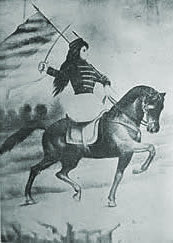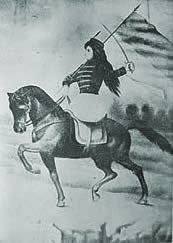
|
Women and Independence in Latin America An exploration of women's involvement in the Latin American Wars of Independence |

|

|
Women and Independence in Latin America An exploration of women's involvement in the Latin American Wars of Independence |

|
Click on one of the images below to see the full-size image
Gender:Female
Ethnic origen: White
Events:
| 1797 | - | England | - | Unknown | - | Born |
| 1825 | - | Mexico City | - | Unknown | - | She arrived here in 1825. |
| 1825 | - | Puebla City | - | Unknown | - | She visited here in 1825. |
| 1825 | - | Veracruz | - | Unknown | - | She arrived in Veracruz in 1825. |
Connections:
Foreign travellersBiography:
An English woman who accompanied her husband, Henry Ward, to Spanish America (he was chargé d'affairs to Mexico from 1825 to 1827). She drew wonderful pictures that illustrate Henry Ward's Mexico in 1827. Her drawings are mainly of the Mexican landscape - scenery and buildings, with some animals, but rarely people. She is referred to as Mrs Ward and signs her drawings “Mrs H.G. Ward”.
She arrived in Veracruz on 11 March 1825 and was carried from Veracruz to Mexico City in a litter with two horses as she was about to give birth to her “first confinement”. (Ward, vol.2, p.264)
She was evidently a woman of strong constitution and character and accompanied her husband on his travels in Mexico their two daughters (one a few months old, the other weak following a brain fever) also went with them. She insisted on delaying their departure for two months until their daughter had sufficiently recovered. (Ward, Vol.2, 396-397)
She preferred to ride on horseback for several hours a day rather than in a carriage: “[Mrs Ward] endeavoured, from the first, to extend her daily rides until she was enabled to perform nearly the whole distance on horseback: which she so far accomplished that she must, I think, have ridden fourteen hundred miles out of the two thousand, to which the aggregate of our journey may have amounted.” (Ward, Vol.2, 406)
Henry Ward praises her stoicism: “It was dreary work getting up, day after day, two hours before sunrise, and sitting for one hour, at least in a cold room, wrapped in a manga or a buffalo skin, with a poor little sick child to take care of, while the complicated arrangements of packing and loading were going on. In December we had a hard frost almost every night; and as there was no possibility of getting a fire of any kind within doors, there was little warmth or comfort to be obtained before the sun rose; and though we knew we should be scorched afterwards, we have often hailed its appearance as a real relief. For the scarcity of rooms, Mrs Ward, the two children, and the maids were usually quartered together." (Ward, Vol.2, 410)
On the way to San Juan a wheel came off the coach carrying their children. The Wards left them, and rode to San Juan, to buy a new wheel and sent it back to the coach. But at 3am the coach still had not arrived: “Mrs Ward became so uneasy for the want of her [5 months-old] child, which was still on the breast, that I resolved to go myself in search of it on horseback.” (Ward, Vol.2, 414)
They were told, “it would be impossible for us, with children and a lady of the party, to attempt to cross the country between Catorce and Durango, where we should find neither houses, nor accommodations of any kind. [...But] Mrs Ward having resolved rather to take her chance of bivouacs, and a little starvation, than to be left behind until we could meet her again at Agua Calientes, we determined to take our own line, and to trust to Providence to carry us through. [...] With the exception of my little girl, who was still far from strong, we were all in admirable travelling condition; so that we looked forward with almost pleasure to the difficulties we were about to encounter.” (Ward, vol.2, 464-465)
Henry Ward describes their basic accommodation at Tlachiquera: "Mrs Ward was lodged in a barn, where she was considerably annoyed on the following morning by a mule, that forced its way in through the shattered door, just as she was beginning her toilet, notwithstanding her vehement entreaties that no one would come in.” (Ward, vol.2, 467-468)
Yet she arrived at the Cañada de Catorce in style: “Mr Macartney, the managing agent of the Catorce Company, had the goodness to take charge of the eldest little girl, with a horse perfectly accustomed to the roads; while Mrs Ward, with the baby in her arms, was seated in a silla de manos, (a sort of sedan-chair, open before,) belonging to the Obregones, which was carried by four Indians.” (Ward, vol.2, 484)
Henry Ward describes a party given for them by the Obregons the day before their departure from Catorce: “In the evening we went to a ball, at which all the belles of the place were assembled. We found the same scarcity of gloves and corsets amongst the ladies, as at Guanajuato, but segars were countless; and though the old Mexican mackaw dress if 1823, (scarlet and yellow, with pink or green shoes,) prevailed in all its purity, the brilliancy of the colours was rendered less intolerable by the clouds of white smoke in which the wearers were enveloped. The utmost good-humour however prevailed, as soon as the appearance of ‘etiqueta rigurosa,’ which the presence of so formidable a person as Mrs Ward at first occasioned, had a little subsided.” (Ward, Vol.2, 515-516)
Their return from Catorce included a steep “formidable” descent: “Yet so familiarised had we become with rocks and precipices, that Mrs Ward did not think of dismounting, but rode down the Cañada without apprehension. She had indeed served a pretty good apprenticeship during her residence in the place, for the road to the two Socabones of La Purisima and La Luz, to both of which she accompanied me, is infinitely worse than that to La Cañada; and even the ascent to the Veta Madre, which she visited two or three times, in order to get a good drawing of the town from the Tiro del Compromiso, is not without danger.” (Ward, vol.2, 517-518)
On the return voyage to England, “to add to our embarrassments”, Mrs Ward gave birth, 10 days before their arrival in Portsmouth. (Ward, vol.2, 705)
References:
Ward, H. G. (1828) Mexico in 1827